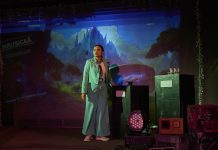The Baltimore Symphony Orchestra graced the Strathmore Music Center on Saturday night with the final and closing performance of their 2013 – 2014 subscription season. It was a perfect culmination to one of their most strongest and certainly most celebrated seasons thus far, in a perfect combination of elevation, poignancy, powerhouse repertoire, and sheer musical talent.

Theme and message are not usually a cornerstone, or even much of a consideration, in most classical programs, but tonight’s performance managed to imbue and convey an inspiring one. As Conductor Marin Alsop explained to the audience, the BSO’s past season and this concert in particular is centered on the idea of “Strength in the face of great adversity.” And this can come in many forms for many people, as shown by the type of repertoire the BSO has chosen to perform.
In the first half, the BSO with frequent collaborators the Baltimore Choral Arts Society and the Peabody Children’s Chorus, performed American composer John Adams’ On the Transmigration of Souls. It is guaranteed that classical audiences have never experienced anything quite like this piece. Commissioned in 2002 by the New York Philharmonic, Transmigration is a work that commemorates the lives lost on September 11, 2001. It is expected that the music and its vision would therefore be close to the heart of any American audience, but Adams has reached deeper into the soul. He has transcended mere music and added a fourth dimension to his work: orchestra accompanies a soundmixing of city sounds and spoken words – disembodied voices – that appear from all four sides of the theater. The words themselves are not lyrics, not even a continuous story. Instead, they are snippets and names the composer himself pulled from the missing posters surrounding Ground Zero in the days and weeks after the attack: both pleas and remembrances by mothers, wives, brothers, sons, and loved ones.

In the composer’s own words, “I want to avoid words like ‘requiem’ or ‘memorial’ when describing this piece because they too easily suggest conventions that this piece doesn’t share. […] I’d probably call [it] a ‘memory space.’ It’s a place where you can go and be alone with your thoughts and emotions…” An apt description, for Transmigration is both a very private and a very poignant experience, yet not one that seems overtly familiar; its an entirely new sound, dichotomous chords and strings and a multitude of voices, weaving with the blares of car horns and the repetitions of “Missing…”
The second half of the concert program features Ludwig Beethoven’s comprehensive Ninth Symphony, his final completed Symphony and what some music critics consider to be not only the man’s greatest work, but also the greatest piece of classical music ever written. High praise, but surely not an over-exaggeration for this behemoth of a symphony. To be more accurate, Beethoven’s Ninth is a choral symphony, in that it utilizes a full chorus along with four vocal soloists in its fourth and last movement. The melodies are well known (Ode to Joy), but do not mistake the commonness of its tune to reflect anything about the piece itself. The Ninth is a monster to approach as an orchestra – long, full of strength, many moving pieces; it requires considerable talent from its musicians, along with coordination and stylistic nuance in direction. The BSO brings all of that and more in conjunction with the Baltimore Choral Arts Society and the talents of its four soloists – Angela Meade, soprano; Jennifer Johnson-Cano, mezzo-soprano; Dimitri Pittas, tenor; and Eric Owens, bass-baritone.

The orchestra, layered with hundreds of voices, fills the hall in a way so unimaginably saturating. It is a stark contrast from the intimate, softer first half with Adams’ modern work, yet the message of strength over adversity is still there. Beethoven, almost entirely deaf when he wrote the Ninth, believed in the transcendence of the power of his music over his own hearing, and in turn, created something so completely awe-inspiring that it brought audience to a standing ovation as conductor Marin Alsop leads the BSO into a final resounding close – the end of a great piece, a great evening, and an absolutely wonderful season.
We can’t wait to see what you have in store next.
Running time: Two hours, with one fifteen-minute intermission.
BSO: Beethoven’s Ninth Symphony was performed for one-night-only on June 8, 2014 at The Music Center at Strathmore – 5301 Tuckerman Lane , in North Bethesda, MD. For future performances at Strathmore, including those by the BSO, please see their calendar of events. For tickets, please call the Strathmore Box Office at (301) 581-5100.




